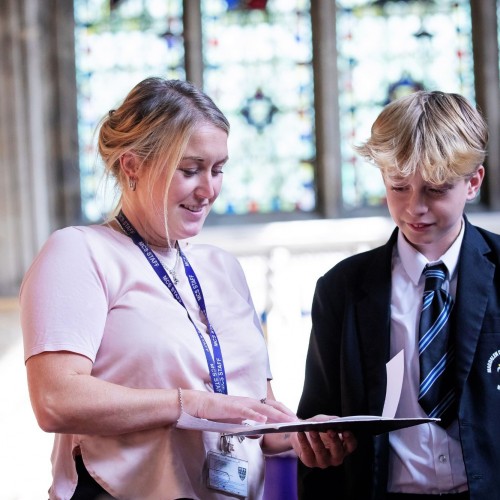Humanities
The Humanities curriculum includes the subject disciplines of Geography, History and Religious Education. Through their study of these disciplines, students will develop knowledge and understanding about people and the world. The Humanities explore the relationship between our physical, external environment and our personal, internal world.
| Year 7 RE |
- God and Jesus - Islam - Hinduism - Sikhism - Humanism |
|
| Year 8 RE |
- Movements in Christianity - Cross-curricular RE - Religion in the extreme - Covenant, passover and Shoah - Patriarchs |
|
| Year 9 RE |
- Christian beliefs - Jewish beliefs - Crime and punishment - Human rights and social justice |
|
| Year 10 RE |
- Religion and Life - Peace and conflict - Relationships and families - Revelation |
|
| Year 11 RE |
- Christian Practices - Jewish Practices |
|
| Year 12 RE |
- God - Good conduct and key moral principles - Sources of wisdom and authority - Self, death and the afterlife - Arguments about the existence of god - Miracles |
- Ethical theories - Evil and suffering - Religious experience - Application of ethical theories - Expressions of religious identity - Gender |
| Year 13 RE |
- Miracles - Gender - Religious language - Christianity and science - Self, death and the afterlife |
- Christianity and Secularisation - Ethics and religion - Religious pluralism - Dialogues |
In years 7 and 8 students study the three Humanities disciplines:
In Geography, the students will explore how their lives are linked to others both locally and globally. They will study physical locations which contrast with Brackley and understand how people live there. The curriculum also asks students to look at how places and peoples have changed over time, alongside challenges for the future of the planet and humankind.
| Year 7 Geography |
- Resources - Ecosystems - Tourism - Our warming planet |
| Year 8 Geography |
- Impossible places - Coasts and rivers - BRICS - Restless Earth - UK links to the wider world |
| Year 9 Geography |
- Population and migration - Cold environments - Globalisation - Weather and climate - Development |
| Year 10 Geography |
- Natural hazards - Urban Issues and challenges - Rivers |
| Year 11 Geography |
- Local area Human fieldwork - Rivers - Economic world - Physical geography fieldwork |
| Year 12 Geography |
- Globalisation - Tectonics - Regenerating places - Coasts - Fieldwork - residential |
| Year 13 Geography |
- Superpowers - Carbon cycle - Health and human rights - Water cycle |
The History curriculum provides students with an overview of British history from 1066 to the present day. Students will analyse what historical sources tell us about life at different points in history; how power, politics, exploration, trade, science and society have shaped the world today. The knowledge gained here supports students in making links across their learning now and in the future.
| Year 7 History |
- Political power 1066 - Political power; all change - Religious power |
| Year 8 History |
- Power of beliefs and ideas - Power of protest: Slavery and the USA - Power of protest: Women and the Vote - Power of protest: American civil rights - Power of change and growth: migration and individuals |
| Year 9 History |
- The power of warfare to change the world - Power of ideology - Power of changing warfare - Power of hatred and prejudice: Holocaust - Power of the modern world |
| Year 10 History |
- Richard and John: Final challenges to power - Germany 1918-1939 |
| Year 11 History |
- Cold war |
| Year 12 History |
- Witchcraft and popular culture; incl Holy Empire, Scotland and East Anglia - The Crusades - The Tudors |
| Year 13 History |
- Witchcraze: Salem, Ending the hunts and concluding our studies - Tudors |
Through the RE curriculum, students study the 6 major religions of the world and reflect on the impact that religion has on everyday life for people in Britain today. Students will learn about people inspired by faith, and how they change the world in which we live.
Each Humanities subject discipline is offered as an A Level course in the Sixth Form. As in other faculties, the content of the curriculum is more challenging and specialised at A Level.



